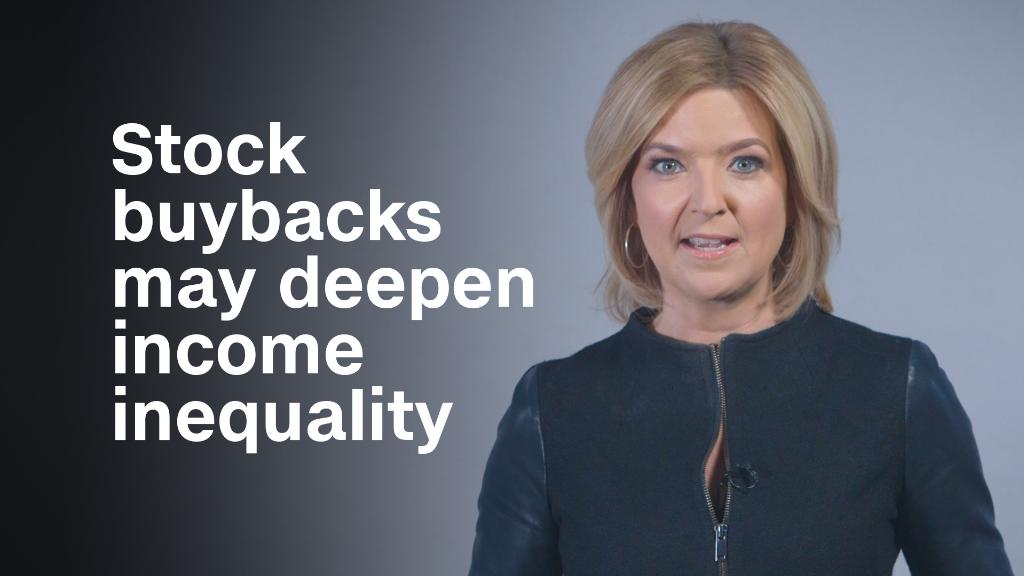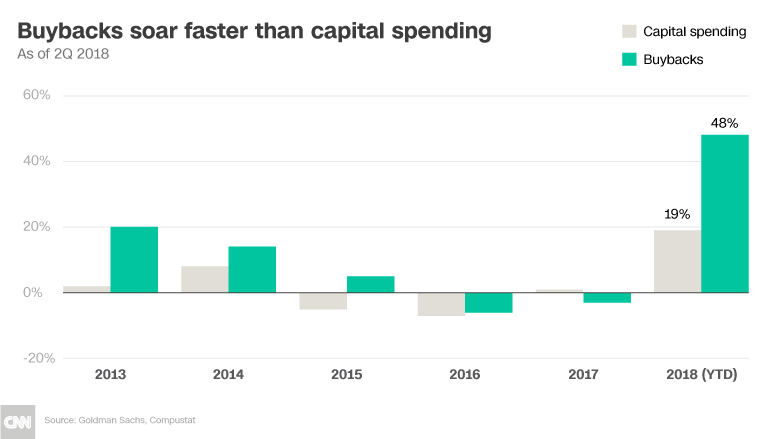
For the first time in a decade, Corporate America is steering more money into stock buybacks than investing in the future.
S&P 500 companies rewarded shareholders with $384 billion worth of buybacks during the first half of 2018, according to a Goldman Sachs report published Friday. That big bonanza for Wall Street is up 48% from last year and reflects spiking profitability thanks to corporate tax cuts and the strong US economy.
But that doesn't mean companies aren't spending on job-creating investments, like new equipment, research projects and factories. Business spending is up 19% — it's just that buybacks are growing much faster.
In fact, Goldman Sachs said that buybacks are garnering the largest share of cash spending by S&P 500 firms. It's a milestone because capital spending had represented the single largest use of cash by corporations in 19 of the past 20 years.
And the trend may not be done yet. Goldman Sachs predicted that share buyback authorizations among all US companies in all of 2018 will surpass $1 trillion for the first time ever.

Apple (AAPL) alone spent a whopping $45 billion on buybacks during the first half of 2018, triple what it did during the same time period last year, the firm said. That included a record-shattering sum during the first quarter.
Amgen (AMGN), Cisco (CSCO), AbbVie (ABBV) and Oracle (ORCL) have also showered investors with big boosts to their buyback programs.
'Blackout' poses risk
Buybacks are typically cheered by shareholders, at least in the short term. One reason is that buybacks artificially inflate earnings per share by eliminating the number of shares outstanding.
Moreover, companies stepping into the market with giant purchase orders provide persistent demand, lifting share prices.
The impact of buybacks is so profound that some worry about how stocks will hold up without them. Companies generally aren't allowed to buy back stock during so-called "blackout" periods that begin the month before reporting earnings.
David Kostin, chief US equity strategist at Goldman Sachs, warned that the upcoming blackout period poses a "near-term risk" to the market. He noted that market volatility tends to be higher during buyback blackouts.
Business spending on the rise
The good news is that large companies are investing a sizable chunk of their winnings from the corporate tax overhaul. The Republican tax law, enacted in late 2017, slashed the corporate tax rate from 35% to 21%. It also gave companies a tax break on foreign profits that are returned to the United States.
Capital spending is on track for the fastest growth in at least 25 years, Goldman Sachs estimates.
"Rumors of the demise of capital spending have been greatly exaggerated," Kostin wrote.
The growth of business spending, much like buybacks, has been dominated by some of the biggest companies in the United States. Goldman Sachs estimates that 79% of the growth in S&P 500 capital spending came from 10 companies alone.
For example, Google owner Alphabet (GOOGL) alarmed investors in April by disclosing more than $7 billion of capital expenditures in the first quarter. Facebook (FB), under fire for its handling of the 2016 election, is spending heavily on people and technology. Microsoft (MSFT), Intel (INTC) and Micron (MU) are also accelerating their capital spending.
Even though CEOs continue to green light vast buybacks, they have been quietly taking a different approach with their own money. Corporate insiders sold $10.3 billion of shares in August, the most since November 2017, according to research firm TrimTabs.


